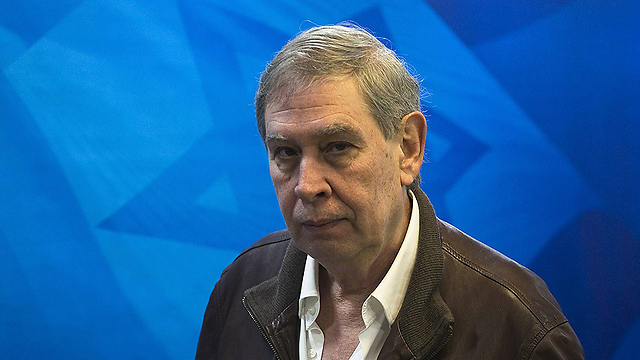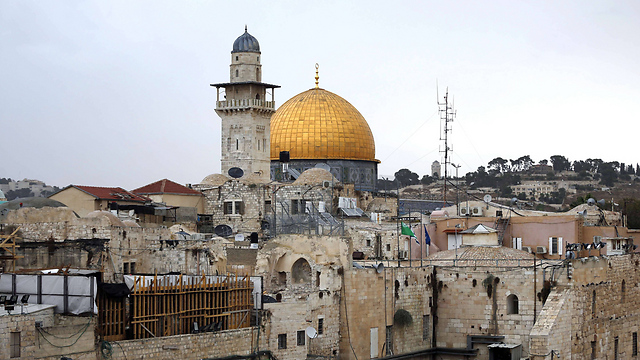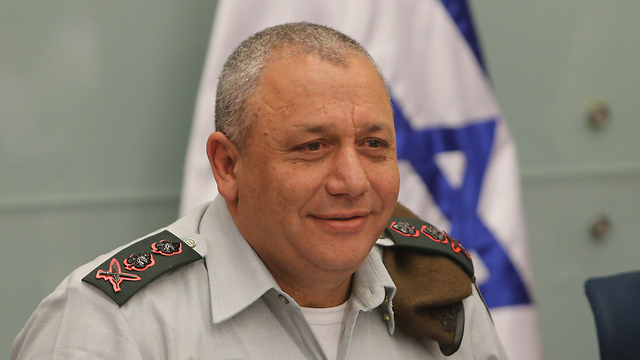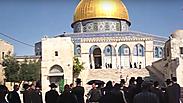
The al-Aqsa mosque. Jordan has its say.
צילום: תנועות המקדש
The King approves, the Shin Bet appeals
Op-ed: Not involving the Shin Bet in a crucial matter of security concerning the Palestinians is surprisingly negligent. But what the political leadership seems to lack is being compensated for, at least partly, by IDF chief Eisenkot.
Imagine that one day the clashes between Jews and Arabs in the Temple Mount escalate into violence, and a wave of lone-attacker terrorism rises. Each day and its stabbing, each day and its vehicular attack; imagine that the local news morphs into protests in Jordan and Egypt, and the rulers there clarify to the rulers over here that things can't go on like this. Something must be done about al-Aqsa.
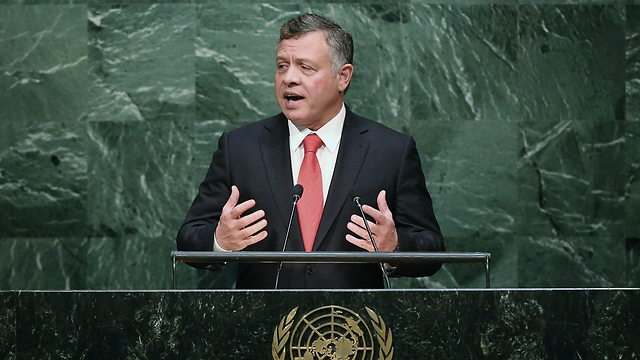
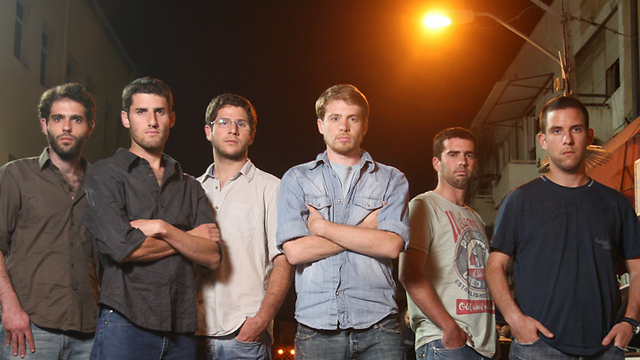
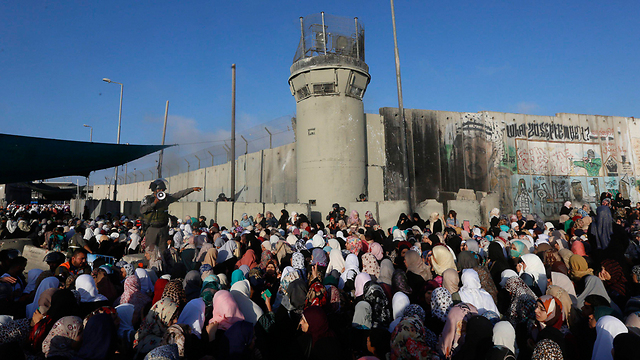
Just imagine.
The Prime Minister somberly remembers that the King of Jordan has special status in regard to the Temple Mount. That status is not only recognized by the Arab and Muslim world, but is also part of the Israel-Jordan peace accords. The Prime Minister is championing a plan that will widen the scope of surveillance cameras at the Temple Mount. What those cameras record will be seen not just by Israeli law enforcement, but also by the Jordanians. Israel will give up some of its sovereignty, and receive calm in return.
The question of who will present this plan to King Abdullah II arises. It turns out that the King has little faith in the PM and his associates, due to a past incident. Someone the Jordanians will believe is needed.
The person whose name comes up is Tamir Pardo, Director of the Mossad: His organization has the Jordanian's trust. Pardo is hesitant to accept the assignment; he's not so sure that whatever promises he gives the King will actually be kept. But the violence goes on – every day a stabbing, every day a vehicular attack, and each stabber that remains living shouts aloud the name al-Aqsa.
Protests in the Arab world also go on, and American Secretary of State Kerry starts traveling around, and amidst all of this pressure Tamir Pardo travels to Jordan.
Imagine that King Abdullah, after contemplation, accepts the plan. But then a problem comes up. It seems that someone in the Prime Minister's close circle, perhaps the PM himself, forgot to inform the Shin Bet of the plan. That's how strong the pressure was to bring about some solution.
The Shin Bet is a major player in any matter that involves Israel and the Palestinians. When you author a proposal that changes the rules of the Temple Mount game, the Shin Bet has to put its stamp of approval on it. Skipping the organization over was strange, insulting, and perhaps also damaging.

King Abdullah II of Jordan. A special status regarding the Temple Mount. (Photo: Getty Images) (צילום: gettyimages)
In any case, the King approved the plan, but the Shin Bet opposed it. Wise men gathered at the Prime Minister's Office and searched for a way out of the mess. Days passed, nights went by, and the intifada changed: Terror attacks went on, daily; not just stabbings and vehicular attacks, but shootings as well. However, the calls for the rescue of al-Aqsa abated: The Temple Mount was pushed aside.
What was urgent - a matter of life and death - in December, could be postponed in January. When February came along, it turned into a negligible nuisance. And the PM lives headline-to-headline. No headlines, no problem.
Every police officer in Jerusalem knows the schedule: Twice a year the Temple Mount becomes an especially sensitive area; during the period of Rosh Hashanah, the Days of Awe, and Sukkot, and during Passover. Masses of Jews come to visit the Western Wall and the alleys of the Old City. Fundamentalists of both sides prepare for battle. Fortunately, this year Passover doesn't clash with any Muslin holidays. But all the current atmosphere requires is a spark.
And then, worrisome discussions will once again be had at the PM's office; and once again a representative will travel to the palace in Amman, carrying an offer the King can't refuse; and once again Israel will swear that this time it's real, this time it will be done, and the crazies of the Temple Mount can say what they will. And so on, and so forth.
The IDF code
IDF Chief of Staff (COS) Gadi Eisenkot is the most curious character in the Israeli establishment. In his articulate way, free of angry sentiment, he fills the leadership vacuum. Next week will mark the first anniversary of his appointment. It was a revolutionary year in several ways.
Eisenkot gave a speech on Tuesday during an event commemorating late former IDF COS Amnon Lipkin-Shahak at the Interdisciplinary Center (IDC) in Herzliya. When speaking about the activists of Breaking the Silence, he didn't speak of them as traitors.
"The IDF conducts itself at a high ethical level, but there are outliers," he said. "If the IDF did not operate according to the IDF code, it could dismantle the military from the inside. When a soldier joins the IDF, he's taught what an illegal order and a blatantly illegal order are. It is explained to him that his duty as a soldier is to not execute a blatantly illegal order. , not to get discharged and break his silence a few years later."
He continued, "I don't say a word about combatants who talk to the media. I can't argue specifics. I can say that after Operation Protective Edge I received complaints by Breaking the Silence people. I asked them to tell us what these complaints were about, and ordered the (IDF) advocate to examine every claim."

Members of Breaking the Silence. "We expect a soldier to hold those values, to act that way in real time," says IDF COS Eisenkot. (צילום: עמית מגל)
Eisenkot spoke of a threat assessment meeting he participated in. The topic of discussion was Palestinian terrorism. "Several commanders said that terror was taking place on social networks these days and not in the town square. That motif was a major thread permeating the discussion. When it was my turn to sum it up, I said the terrorism wave began due to three reasons: The change in the status-quo at the Temple Mount, the decline in the stature of Arab leadership, and a harsh economic reality. The events began in Jerusalem and trickled down to Hebron, where 67 casualties have been suffered."
"Peopled didn’t understand, until I told them: I'm not talking about the current wave, I'm talking about the 1929 Palestine riots. Terror has been accompanying us long before social networks."
Eisenkot continued, "How do you deter lone wolves who are willing to kill when the likelihood of them getting out alive is low? How do you deter a knife-wielder who writes that he's going out to commit a terror attack and then goes out to commit an attack an hour later? How can we defend every Israeli citizen everywhere?"
"We developed a functioning tactical-operative pattern of action in confronting Palestinian terrorism over the years. We managed to defeat terrorism a decade ago with prevention abilities and intelligence. That perception, which led us to very good achievements, becomes much more complex when it's a person who isn't dependant on an organization's infrastructure. Everyone has a kitchen with a knife at home, and anyone can go commit an attack."

Palestinians at the Qalandia checkpoint. The more permits Israel can issue the fewer likely terror attacks there are. (Photo: EPA) (צילום: EPA)
"We combine defensive components. Each night, six brigades operate in the West Bank. Dozens of battalions handle prevention. Those who aren't familiar with the realities in the field are calling for an Operation Defensive Shield 2. The IDF operates with total freedom, not distinguishing A, B, and C territories. Another component is our efforts to differentiate terrorism and the (civilian) population, allowing them to have hope and make a living."
The COS said he asked to be given a profile of a potential terrorist. The answer was that it could be almost anyone. He then asked to get a profile for someone who was likely not to become a terrorist. The answer was clear: Those who have an Israeli permit – a work permit in Israel or in the settlements, a healthcare permit, or a commerce permit. Other than once in the current wave, in Tel Aviv, people with permits did not commit terror attacks. Sons of Palestinians who have permits didn't go out and commit attacks either, again with just one exception. Who did commit attacks? Illegal workers. That's why the military is asking for completion of the separation wall's construction: So that illegal entries may be prevented, potentially allowing tens of thousands more people to receive work permits.










